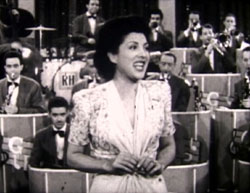 Dance with a Dolly (1944) opens with George Paxton & His Orchestra instrumentalizing with lots of brass & reed.
Dance with a Dolly (1944) opens with George Paxton & His Orchestra instrumentalizing with lots of brass & reed.
It's a bouncy swing number with the melody intentionally close to that for "Buffalo Gals Won't You Come Out Tonight," hence dangerously close to the soundie subgenre called "Korn."
Then out saunters Liza Morrow to tackle the lyrics: "As I was walking down the street, down the street, down the street/ There was somebody that I chanced to meet, mighty fair to see/
"He asked me if I'd wanna have a talk, have a talk, make some talk/ All the girls a-standing on the walk were wishing they were me..."
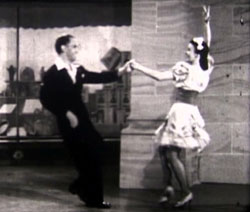 Terrible lyrics really, & Morrow's interpretation is mediocre at best. A line of lyric here or there is cute: Terrible lyrics really, & Morrow's interpretation is mediocre at best. A line of lyric here or there is cute:
"Dance with the dolly with the hole in her stocking, gonna dance by the light of the moon," is both cute & acknowledges "Buffalo Gals" as intentionally rather than accidentally plagiarized.
At the instrumental break there's a quick-cut to a "street scene" or a minimally stage-decorated approximation thereof.
In the "street" we see the husband & wife dance team of "Gaylord & Norma" (Frank Gaylord & Norma Griffith, very minor stars of niteclubs & early television).
They are doing a so-so routine closer to ballroom than anything hip, though they do take a couple of boogie woogie stances without actually boogying.
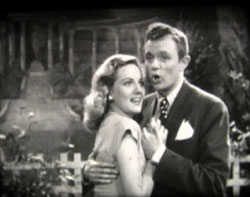 Betty Underwood is seated on a bench in flowery garden park. Bob Kennedy leans over the bench from behind & sings the introductory lines of Whispering (1946). Betty Underwood is seated on a bench in flowery garden park. Bob Kennedy leans over the bench from behind & sings the introductory lines of Whispering (1946).
The song's introductory lines makes the claim for itself, "Honey I've got something to tell you/ And it's worthwhile listening to..." though in fact this one's not much worth listening to.
The song proper runs: "Whispering why you cuddle near me/ Whispering so no one can hear me/ Each little whisper seems to cheer me/ I know it's true/ There's no one dear but you..."
The 1919 tune would've already been old-fashioned in 1919. It is given no update in interpretation, it's just a nostalgia piece of a bygone era. Bob & Betty have, during Bob's lame stylings, stood & hugged, then sat down together on the bench. How dramatic.
This dreary soundie was recycled into the Official Films home-movie one-reeler Love Songs (1947) together with the uncool Harry Cool's My Blue Heaven (1945) & Wendy Bishop's Blue Moon (1946). Several other soundies reviewed on this page are on the dvd compilation The Swing Years: Sweet Lorraine (2004).
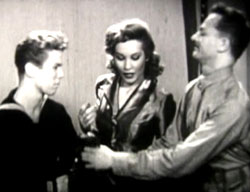 Penny Edwards would a decade later become a star of B westerns. Early in her career she made what appears to be her only soundie, When It Rains (1943), included in the dvd compilation The Swing Years: Sweet Lorraine (2005).
Penny Edwards would a decade later become a star of B westerns. Early in her career she made what appears to be her only soundie, When It Rains (1943), included in the dvd compilation The Swing Years: Sweet Lorraine (2005).
Flanked by two soldiers as soon as she enters a U.S.O. club -- sailor on one side, jarhead on the other -- they compete for the privilege of taking her raincoat. The guys sing the first two lines of repeated lyric, then Penny sings the reply:
"What do you do you do when it rains/ What do you do when it rains/ I call a boyfriend on the phone/ And meet him in a dim-out zone/ So he & I can be alone/ That's what I do when it rains.
"What do you do when it pours/ What do you do when it pours/ Instead of going to a show/ I hurry to the U.S.O./ To see a million guys I know/ Oh what a place when it pours."
The song is a cute one of the war years aimed at soldiers who were great costomers for the Mills Panoram visual jukeboxes whenever they were on leave in the states. Penny's cute as a button, & her voice is uniquely, liltingly attractive, fine for a lackadaisical jazz number.
Two soldiers & two sailors sing the choras: "Rain, rain keep on rainin'/ Raining like a sun of a gun/ Rain, rain, who's complainin'/ Thanks for pourin' out the fun."
Penny starts the next verse: "Never be blue when it rains/ Here's what to do when it rains/ You get the one that you adore/ You kiss & kiss & kiss some more/ You let it rain & let it pour/ That's what I do, waht do you do when it rains?"
More whimsical lyrics are traded off by the guys & Penny, who looks a bit like a young Gina Davis. The instrumental arrangement is simple & well done, restricted to piano & trumpet (another woman in the club is at a piano but we can't see the horn player). It all has a live-show tone & a romantic war-era authenticity, given that it sure-nuff is authentic.
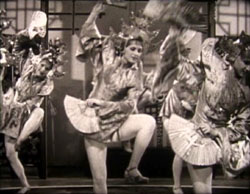 The Winnie Hoveler Dancers made several soundies. Chop Chop (1943) is colorful, & more a "dancie" than a soundie, but a mite racist in its stereotyping.
The Winnie Hoveler Dancers made several soundies. Chop Chop (1943) is colorful, & more a "dancie" than a soundie, but a mite racist in its stereotyping.
The white dance troupe is wearing daughter of Fu Manchu chorus line costumes, as the music marks out of faux-Chinese rhythm. The stage is made out a bit to look like a Chinese themed niteclub stage.
They're dancing to a twinked with version of "Chinatown, My Chinatown" passing itself off as an original number so as to pay no royalties for it.
Neither the music nor the dance is anything special, but it can entertain. Unnoticed for some while is Iris Karyl sitting in the extreme back of the stage in a wooden throne, watching the five chorus girls dance & stomp. Eventually she hops out of her seat & does a solo dance while the other girls fan themselves in back.
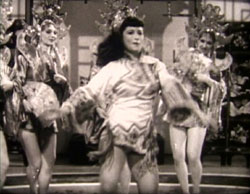 Iris is better than the others but her dance amounts to calisthetics & twirling., The twirls show her undies as the dress whirls up, which seems to be the real point. It's hard to tell if anyone knows how silly they are. Iris is better than the others but her dance amounts to calisthetics & twirling., The twirls show her undies as the dress whirls up, which seems to be the real point. It's hard to tell if anyone knows how silly they are.
Iris Karyl is not otherwise known because the Winnie Hoveler Dancers in a series of soundies took turns featuring different members of the troupe in solo dances, & for most this would be their three minutes of fame, & no more.
Other of their "dancies" included Hats Off (1943), Riff (1943), Broken Hearted Blues (1945), & a half-dozen others.
Chop Chop was included in the Official Films one-reel home movie International Parade (1945) together with Kay Lorraine representing Ireland with The Kerry Dance (1942) & Claudia Coralli representing Russia in At a Gypsy Campfire (1944).
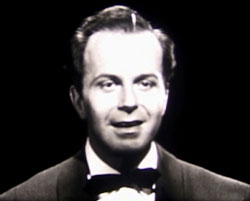 Don Nelson, probably best remembered as being the announcer on the Jack Benny Show, stands in front of a curtain asking us to remember Ronnie Kemper's hit recording of "Cecilia." Don Nelson, probably best remembered as being the announcer on the Jack Benny Show, stands in front of a curtain asking us to remember Ronnie Kemper's hit recording of "Cecilia."
With specific reference to "the soundies now present to you," he turns us over to Ronnie who is to present to us a song about Cecelia's little sister, Loretta (1942).
The scene shifts to a snackbar or exceedingly tiny cafe. Two girls are sitting together at the only table. A third girl's in the background sitting on a bar stool. A young collegiate fellow is putting a coin into a juke box, then turns to join the the girl at the bar.
Yet another girl saunters up to jukebox to watch the record being selected, & we get a close-up of the record being laid into place by the machine, then a close-up of what's about to play. It's Ozzie Nelson & His Orchestra playing "Loretta."
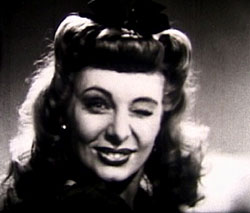 Ronnie Kemper's head & shoulders are overlaid as a double-exposure onto the image of the spinning record. He looks about thirty-five & probably not the first choice of singer the collegiates would've made when dropping coins in the Panoram. Ronnie Kemper's head & shoulders are overlaid as a double-exposure onto the image of the spinning record. He looks about thirty-five & probably not the first choice of singer the collegiates would've made when dropping coins in the Panoram.
Kemper was well enough known in his day, usually doing double-duty as big-band pianist as well as occasional singer for Dick Jurgens & His Orchestra, the Horace Heidt Orchestra, & others. He was also a songwriter & it's my guess he wrote this one.
"You've been playing hard to get, Loretta-ta/ But I'll make you love me yet, Loretta-ta..." The lyrics suck & the extra "ta" on Loretta's name adds geekiness instead of pop charm. It's a lousy romantic tune, & no wonder this soundie waited a minute before showing us Ronnie at all, he has all the screen charisma of a meadow died back in winter.
As his weak & tepid voice continues to threaten unwanted love for Loretta, we get a couple jump-cuts to women in the cafe, & to the young couple. Hard to tell if the lone blonde is supposed to be Loretta herself. She's leaning on the jukebox very interested in the song.
At the instrumental break, we're shown scenes in the snackbar, as the pre-recorded Ozzie Nelson Orchestra is not actually present to show playing. Eventually the Loretta stand-in starts dancing, lifting up her skirt way high but only for a split-second.
This is dancer Billie Mayshell, a burlesque star, & crusty enough that she might indeed go for the older singers. She gets quite antic & can kick her legs above her head, but she's dancing to a completely different song much faster than the slow one we're hearing.
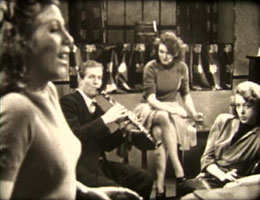 Though copyrighted in 1945, this Jeri Sullavan soundie Memphis Blues was filmed in 1942. Jeri was a big band singer of merit, & in A Song is Born (1947) when you see actress Virginia Mayo singing, that's actually Jeri Sullavan's voice; & in Love that Brute (1950) you're hearing Jeri while Jean Peters appears to be singing.
Though copyrighted in 1945, this Jeri Sullavan soundie Memphis Blues was filmed in 1942. Jeri was a big band singer of merit, & in A Song is Born (1947) when you see actress Virginia Mayo singing, that's actually Jeri Sullavan's voice; & in Love that Brute (1950) you're hearing Jeri while Jean Peters appears to be singing.
For Memphis Blues she proves herself a good basic swing vocalist, praiseworthy even if not unique. The setting for this soundie is a run-down little club.
A clarinet player is seated nearby. A cigarette hangs from the pianist's lips. The camera pans across the small audience at tables & finds Jeri singing from the opposite side of the small club, away from the musicians, leaning on the bar much as did Bessie Smith in St. Louis Blues (1929), which was in fact directed by this little soundie's director!
The number commemorates W. C. Handy's blues compositions, but Jeri's not singing one of Handy's songs. With little dubious romanticisms, the lyric runs in part:
"I never will forget the tune that Handy called the Memphis Blues/ That melancholy strain/ That ever haunting refrain/ Is like a darky moaning a song..." It's just a mite too precious to praise more than a little.
This soundie was included in the one-reel home-movie Sophisticated Gals (1947) together with Grace Barrie singing Nobody Makes a Pass at Me (1942) & Jeni Freeland singing I'm a Big Girl Now (1946).
copyright © by Paghat the Ratgirl
|
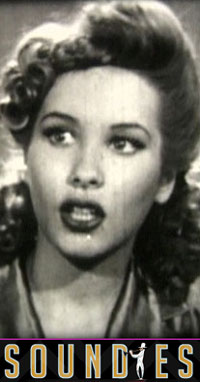

 Terrible lyrics really, & Morrow's interpretation is mediocre at best. A line of lyric here or there is cute:
Terrible lyrics really, & Morrow's interpretation is mediocre at best. A line of lyric here or there is cute:


 Iris is better than the others but her dance amounts to calisthetics & twirling., The twirls show her undies as the dress whirls up, which seems to be the real point. It's hard to tell if anyone knows how silly they are.
Iris is better than the others but her dance amounts to calisthetics & twirling., The twirls show her undies as the dress whirls up, which seems to be the real point. It's hard to tell if anyone knows how silly they are.
 Ronnie Kemper's head & shoulders are overlaid as a double-exposure onto the image of the spinning record. He looks about thirty-five & probably not the first choice of singer the collegiates would've made when dropping coins in the Panoram.
Ronnie Kemper's head & shoulders are overlaid as a double-exposure onto the image of the spinning record. He looks about thirty-five & probably not the first choice of singer the collegiates would've made when dropping coins in the Panoram.